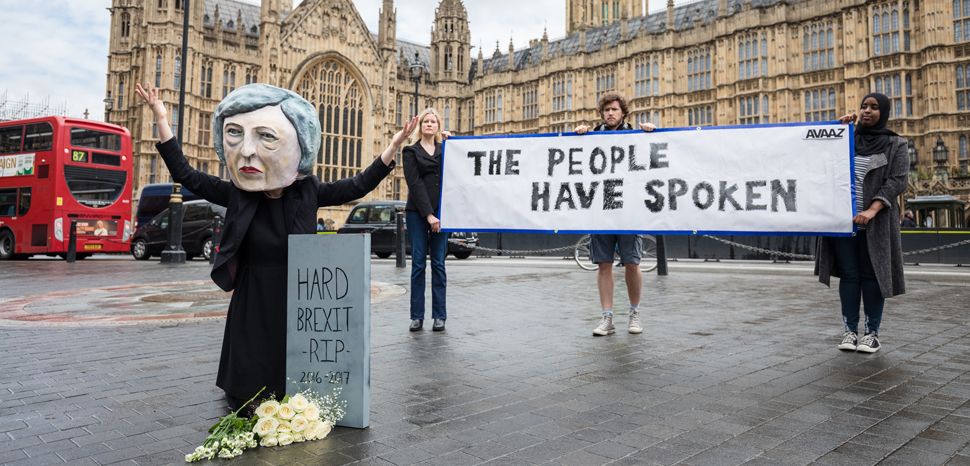Nobody said the road to a successful Brexit would be easy; yet very few said it’d be near impossible. It seems with every passing milestone, the dearly held dream of over 17 million Brits is pulled farther out of reach. And as it turns out, it’s not the EU doing most of the pulling. In fact, Juncker and continental bureaucrats seem to be displaying themselves as above the fray completely.
Almost every single measure of disapproval besides outright rejection of every aspect of the deal May’s government is desperately trying to reach with Brussels has been expressed. The momentum is so strong against an idea that seemed popular enough almost two years ago, that basic functions of implicating a plan are considered major victories. When it came time to pass the portion of the plan responsible for taking care of the Customs Union, whose perceived wrongdoings on the British market was one of the original reasons Brexit became so popular in the first place, the government’s proposal barely squeaked by both Houses of Parliament, but not before a few members of the prime minister’s cabinet quit to join the moderate rebellion.
The real question however is: Why would anyone expect anything less than the current situation? Brexit was never the Conservative Party’s idea; it was always one of its’ worst nightmares. Back in January 2013, after months of flustered pestering from fringe euro sceptics, Prime Minister David Cameron’s pledge to hold a referendum seemed like the easiest solution to a complicated problem. And this wasn’t the first time British politicians shrugged off taking legislative responsibility, at the price of their future electoral fortunes, by prescribing so-called democratic remedies.
During the 1970 general election, the Conservative Party was in full support of expanding their nation’s participation in the EU. In fact, Tory leader Edward Heath’s well-placed optimism shined through every aspect of his time as PM, including the night before the House voted. “Tonight, when this House endorses this motion, many millions of people right across the world will rejoice that we have taken our rightful place in a truly United Europe!” a boisterous Heath proclaimed to his colleagues. A few years later when Heath’s confidence in the British people was put to the test during the 1975 Referendum on the European Community, he wasn’t disappointed. With a national turnout of 64%, votes to remain in the common market trounced opposition at 67% in favor. At the time, both the Conservative and Liberal Party both supported staying in the organization, while Labour’s unwelcomed infighting on the matter forced them to the sidelines.
Firebrands can ramble to their heart’s most ambitious desires, but the truth remains that the Conservative heroes that euro sceptics draw inspiration from would’ve been themselves skeptical over leaving such an integral union like the EU so rashly. Longtime Thatcherite and key advisor to the Iron Lady Lord Powell made clear in a 2016 Sunday Times article that his former boss, despite her well known frustrations with the EU, would’ve been a little more paced towards the issue today: “Margaret Thatcher’s heart was never in our membership of the EU. But l am convinced her head would continue to favor staying in on the conditions now on offer.”
“There were certainly times as prime minister when her frustration with Europe boiled over. The one thing I never heard her propose was Britain’s withdrawal from the EU.” Perhaps she would have persevered for longer before settling than the present prime minister, and raged more mightily. But at the end of the day I am confident she would have settled, and for something very close to what is on offer now.”
Cameron was merely following in the footsteps of past Tory leaders when he let the idea’s fate rest at the mercy of the usually reluctantly pro-EU people. He didn’t ever seriously contemplate that the people of the island nation would buck a 50-year political trend and make a sharp right-turn. The vast majority of polls showed Remain was going to win. So what happened? Well, something that everyone should’ve expected.
You can convincingly blame the result of the 2016 June referendum on a diverse number of culprits, but the thing that cannot be denied is the generational divide that steered the vote. The vast majority of those under 44 voted for Remain, while their older counterparts went strongly for Leave, according to BBC Exit Polls. The same spreadsheet reveals that the areas of the country with the most elderly, least college graduates, and most ‘English’ identifying residents all overwhelmingly voted Leave. Not only that, but a comparison between the 1975 and 2016 votes reveals that the area’s that once strongly supported Remain years ago were now voting with Leave. The conclusion? The ideological blurring of party lines, spurred on by contemporary issues like immigration and terrorism, affected more than just Britain’s general elections and Europe’s political scale.
Cameron put his trust in a populace that faced a different set of anxieties and issues than their 1975 counterparts. His bet didn’t pan out, and we all know how his story ended: a bitter resignation followed by post-political certainty in the righteous nature of his decision. And if his motivations were purely moral and democratic, he’d be right. However, if even partially strategic in origin, he needn’t deny what everyone readily sees: it was a choice that ended his political career.
Brexit was never Conservative. It was always the brainchild of groups like UKIP and men like Nigel Farage, who’d always felt their ideas were sufficiently different from the Conservatives to start their own party. If support among Tories for leaving the EU had been strong enough, they’d never have needed to start their own movement to begin with. While it’s true that some politicians, like MPs Rees Mogg and Boris Johnson, both strong euro sceptics, gained strong followings after Brexit, it’s still clear that the majority of Conservatives aren’t as definite on the issue. When May faced the test of affirming her party’s support toward a moderate approach to Brexit shortly after Cameron’s resignation, she carried 60% of the party vote on the second ballot.
Not only did Cameron campaign for Remain, May did as well, both of whom had the backing of many prominent Conservative Party members. The two only changed their tune after the referendum results showed that the people wanted something different, and they had to provide it.
The very concept of Brexit – the Eurosceptic plurality of the British people and the political culture they have cultivated over the years – fundamentally cannot co-exist with a ‘soft’ Brexit. It goes against the very core of the movement led by a man known for taunting EU MP’s to their face. Nothing even remotely moderate or cautioned exists in the DNA of a movement dedicated to the total destruction of such a powerful institution. Therefore, even if Conservatives can pull off a limited Brexit (the only one Parliament is clearly open to), and that’s a big if, it still won’t be what those who make up the core of the pro-Brexit faction want. The results? No matter what happens, Conservatives and those who made up the core of the Leave vote will never agree. Theresa May might get her Brexit, but it’ll never be one which pleases those whose vision is impossible to implement in her divided party.
When Brexit spilled over, it was merely the mess that Conservatives were forced to clean up. They were never the ones who wanted it to manifest in the first place. In fact, it’s plausible, considering that Labour has historically been much warmer to the idea of Leave than Conservatives, that if Corbyn was in power instead of May at the beginning of the mop-up process, he’d be making the same decisions, and as a result, making the same mistakes.
Brexit, as a process, was always going to fail because it was born out of the politically opportunistic passions of groups like UKIP, who have always been confined to the outer ideological wasteland of British conservatism not because of any high level conspiracy, but because their ideas and beliefs are fundamentally not in line with core conservative principles that go back to Churchill. Brexit was an accident that Conservatives have been forced to clean up; and with each defeat, their resigned patience for being the country’s janitor seems to be running out.
The opinions, beliefs, and viewpoints expressed by the authors are theirs alone and don’t reflect the official position of Geopoliticalmonitor.com or any other institution.




